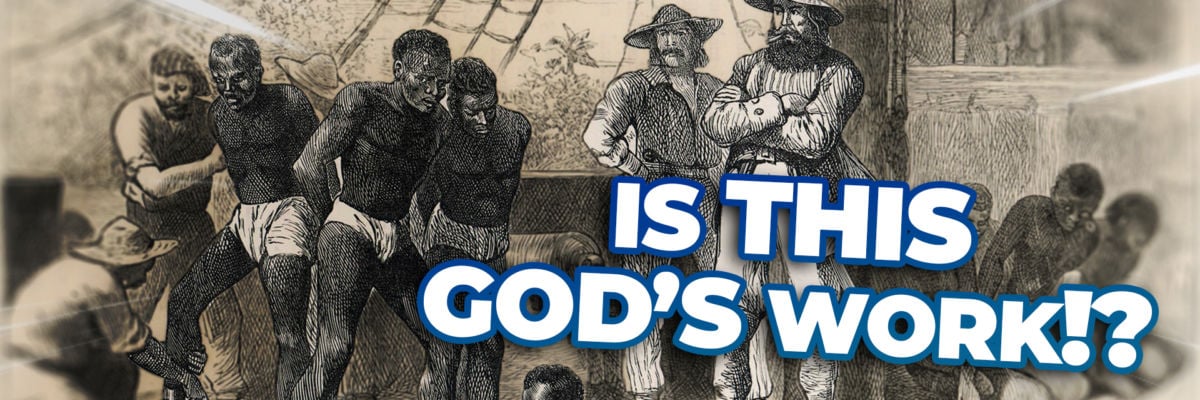
Don Johnson, author of Twisted Unto Destruction, explains his claims that slavery and racism have been enabled by and are linked to the Protestant “Bible Alone” theology.
Purchase Don’s new book, Twisted Unto Destruction: How “Bible Alone” Theology Made the World a Worse Place:
https://shop.catholic.com/twisted-unto-destruction-how-bible-alone-theology-made-the-world-a-worse-place/
Watch the full Catholic Answers Live show from September 28, 2022:
https://www.catholic.com/audio/cal/twisting-scripture
Transcript:
Let’s start with um racism and the actual history of racism over the last 500 years, because Sola Scriptura is 500 years old. Well, it’s 505 years old, I think, this year. So we’ve had a lot of racial problems in the West in the last 500 years. So tell me about how that’s involved with Sola Scriptura.
Sure. So at the age of exploration, which coincided quite closely with the Reformation, right. You’ve got people traveling around the world looking for money, starting to sell people. I mean, America. I’ll jump ahead a little bit to the thesis of the book. But in America, I think you have almost the distilled version of what Sola Scriptura like looks like morally because it was so Protestant in its founding, right?
Yeah, we are. Yeah, it’s just a very Protestant nation, just as a fact. I mean, not that there wasn’t Catholics, but in general, a very Protestant nation and one that was built out of, you know, the wars of religion and all of that whole mess. Right. Right. And so what do we do? So. Well, you start.
Let’s jump to the slave trade. All right. 1619. We’ve got slaves sold in the British colonies. Well, this gave the Christians pause there. Of course, they’re like, well, should we be buying and selling people? It seems like there’s you know, I’m a little I’m a little scared. I’m little uncomfortable with this, after all. But on the other hand, you know, it’s making me some money.
So is there some way is there some way to justify it? Well, from a Catholic mean, just from a Catholic perspective, this had been although the certainly there was Catholic slave traders. I mean, yeah, those boats were that was probably stolen from I think it was St John the Baptist was the church or was the boat that got those first slaves were taken from.
So it’s not the Catholics weren’t doing the slave trading, but the official announcements of the church were very much clear, like you will be excommunicated if you continue in this. Yeah. So the the official position of the church was unequivocal. No slave trading. This will get you sent to hell. But the Puritans, the Protestants of America didn’t listen to that.
So what are we going to do as Protestant Americans? Well, very quickly, they started to relook at scripture to support this. And so you would look at passages like The Curse of Ham, Noah’s son. And this has been a has a long tradition in America of an explanation for why we can degrade the African men and women because they are the descendants of Ham, who was the cursed son of Noah.
And the therefore, they were actually meant by God to be in slavery. And this continued to get more and more elaborate. Like not only is slavery their lot in life, according to the decree of God as we can read in Scripture, but it’s actually good for them to be in this state of servitude so that they can be drawn closer.
Like at one point you had a sort of pharisaical approach to the slaves where, “well, are they really human?” Like some people would say, “Well, do we have to love one another?” You know, like love your neighbor is sort of like the whole love your neighbor thing. “Well, who’s my neighbor?” And you’re like, Well, are they really human?
Do we have to give them human dignity? So you would awill know we don’t have to because they are not human. Other say well, no, they’re humans. So how are we going to get around that? Well, they’re there under the curse of ham. Well, maybe they’re not under the curse of ham, but is there some other scriptural passage that we can use to support the slave trade?
And they would go to elaborate issues of like government for example, well, their servants. And so they should obey the government and stay in a state of servitude like from Saint Paul promised to. Yeah, right. All right. So all of these really started to embed very early on in the American experiment experiment, a biblical justification for slavery in particular.
And then the racism, I think I feel like kind of built out of that. Now this you’re like, well, okay, then we get over that, but realize that this was no small issue. Like we fought a war over this and one of the reasons a good Protestant historian, by the way, Mark Noll, who’s one of the great historians of Protestantism in America, very explicitly says, and also people like Paul Johnson that if we did not on both sides of the Civil War, think that we were on God’s side,
Right. Like you look at the the writings of the evangelical preachers in the South at the time. “We are fighting against the satanic godless attack on scripture like we are fighting against the enemies of God. When we defend slavery, we are fighting on behalf of the Bible and God itself.” And so you had this holy war attitude. Yeah.
00:04:47:28 – 00:05:04:15
Unknown
Which was reflected a little less maybe, but still to some degree from the North. I mean, they’re still motivated. It’s not like we had a huge atheist population. I mean, everybody’s basically Bible believers at the time, right? Yeah. And so you would justify the North saying, well, no, we are on the side of God, love your neighbor. These are human beings.
We shouldn’t be enslaving them. The the motive, the passion. It was not just a war of economics, but a war over interpretation of scripture. And if you didn’t have that scriptural backing, you wouldn’t have had the passion and on both sides. And so I believe I go with Mark Noll I mean, obviously, you know, people can debate, but I go with Mark null that it actually made that situation worse and certainly even to this day implemented a I mean, you can look at scripture, you can look at passages, sermons preached in the 1970s on the curse of Ham to support school segregation.
It’s not like this went away. Right. Right. And so, yeah, I think that instilled in America this scriptural support for what I see as a grave evil. And then this becomes a self-perpetuating thing because then the child is taught about this and this is becomes their pattern of the way they interpret Scripture. But I suppose that at root then what you’re saying is that that Scripture is, is not a self interpreting document.
Somebody’s got to interpret it. And there’s always going if we say there’s no authority to the competent to, to interpret it, the church, namely, then there’s always going to be the opportunity to say, well, what the Bible really teaches is transgenderism. What the Bible really teaches is slavery, or what the Bible really. And that will go on endlessly.
We can always justify what we want to do using the Bible. You can always justify anything. And that’s the thing. Like it’s not just the fact that we can justify our doctrinal positions, it’s that we justify our actions and our attitudes that quite possibly are sinful. That’s really where I feel like the rubber hits the road. I mean, we all know that.
Yeah, it doesn’t speak for itself. Scripture has to be interpreted, any writing has to be interpreted, but it is the ethical implications of that that really cause a lot of pride in Luther. I mean, Luther himself saw this. You read what Luther said about the morality of the church, everything. Like “I can’t believe all the immoral people that have resulted from their terrible interpretation of the text.
I mean, everybody should be interpreting the Bible the way I am.” Right? It was quite derogatory, but it was a it was the ethical issue that he was mostly concerned about.



